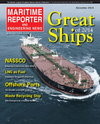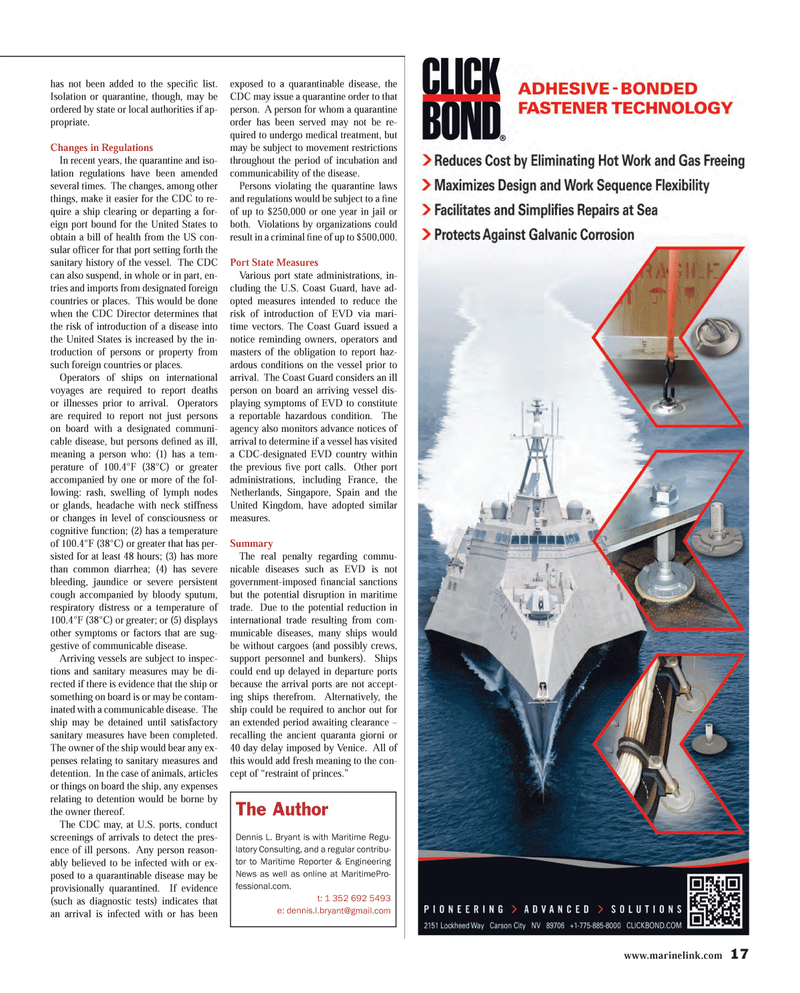
Page 17: of Maritime Reporter Magazine (December 2014)
Great Ships of 2014
Read this page in Pdf, Flash or Html5 edition of December 2014 Maritime Reporter Magazine
www.marinelink.com 17 has not been added to the specifi c list.
Isolation or quarantine, though, may be ordered by state or local authorities if ap- propriate.
Changes in Regulations
In recent years, the quarantine and iso- lation regulations have been amended several times. The changes, among other things, make it easier for the CDC to re- quire a ship clearing or departing a for- eign port bound for the United States to obtain a bill of health from the US con- sular offi cer for that port setting forth the sanitary history of the vessel. The CDC can also suspend, in whole or in part, en- tries and imports from designated foreign countries or places. This would be done when the CDC Director determines that the risk of introduction of a disease into the United States is increased by the in- troduction of persons or property from such foreign countries or places.
Operators of ships on international voyages are required to report deaths or illnesses prior to arrival. Operators are required to report not just persons on board with a designated communi- cable disease, but persons defi ned as ill, meaning a person who: (1) has a tem- perature of 100.4°F (38°C) or greater accompanied by one or more of the fol- lowing: rash, swelling of lymph nodes or glands, headache with neck stiffness or changes in level of consciousness or cognitive function; (2) has a temperature of 100.4°F (38°C) or greater that has per- sisted for at least 48 hours; (3) has more than common diarrhea; (4) has severe bleeding, jaundice or severe persistent cough accompanied by bloody sputum, respiratory distress or a temperature of 100.4°F (38°C) or greater; or (5) displays other symptoms or factors that are sug- gestive of communicable disease.
Arriving vessels are subject to inspec- tions and sanitary measures may be di- rected if there is evidence that the ship or something on board is or may be contam- inated with a communicable disease. The ship may be detained until satisfactory sanitary measures have been completed.
The owner of the ship would bear any ex- penses relating to sanitary measures and detention. In the case of animals, articles or things on board the ship, any expenses relating to detention would be borne by the owner thereof.
The CDC may, at U.S. ports, conduct screenings of arrivals to detect the pres- ence of ill persons. Any person reason- ably believed to be infected with or ex- posed to a quarantinable disease may be provisionally quarantined. If evidence (such as diagnostic tests) indicates that an arrival is infected with or has been exposed to a quarantinable disease, the
CDC may issue a quarantine order to that person. A person for whom a quarantine order has been served may not be re- quired to undergo medical treatment, but may be subject to movement restrictions throughout the period of incubation and communicability of the disease.
Persons violating the quarantine laws and regulations would be subject to a fi ne of up to $250,000 or one year in jail or both. Violations by organizations could result in a criminal fi ne of up to $500,000.
Port State Measures
Various port state administrations, in- cluding the U.S. Coast Guard, have ad- opted measures intended to reduce the risk of introduction of EVD via mari- time vectors. The Coast Guard issued a notice reminding owners, operators and masters of the obligation to report haz- ardous conditions on the vessel prior to arrival. The Coast Guard considers an ill person on board an arriving vessel dis- playing symptoms of EVD to constitute a reportable hazardous condition. The agency also monitors advance notices of arrival to determine if a vessel has visited a CDC-designated EVD country within the previous fi ve port calls. Other port administrations, including France, the
Netherlands, Singapore, Spain and the
United Kingdom, have adopted similar measures.
Summary
The real penalty regarding commu- nicable diseases such as EVD is not government-imposed fi nancial sanctions but the potential disruption in maritime trade. Due to the potential reduction in international trade resulting from com- municable diseases, many ships would be without cargoes (and possibly crews, support personnel and bunkers). Ships could end up delayed in departure ports because the arrival ports are not accept- ing ships therefrom. Alternatively, the ship could be required to anchor out for an extended period awaiting clearance – recalling the ancient quaranta giorni or 40 day delay imposed by Venice. All of this would add fresh meaning to the con- cept of “restraint of princes.”
The Author
Dennis L. Bryant is with Maritime Regu- latory Consulting, and a regular contribu- tor to Maritime Reporter & Engineering
News as well as online at MaritimePro- fessional.com. t: 1 352 692 5493 e: [email protected]
MR #12 (10-17).indd 17 12/2/2014 11:52:32 AM

 16
16

 18
18
